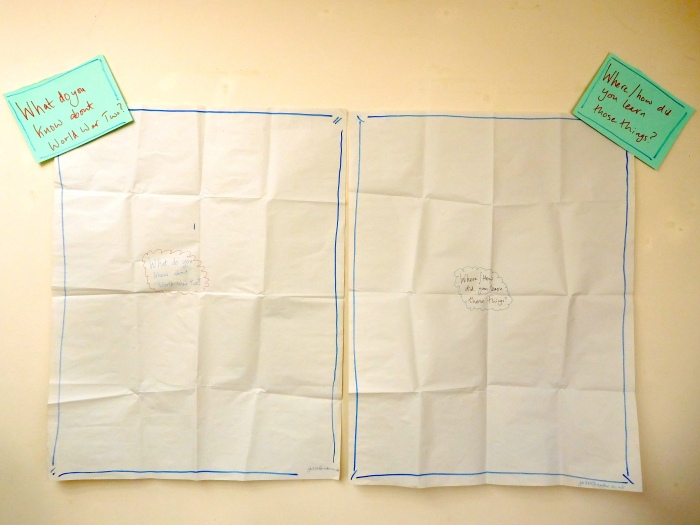
I decided to try something a little different for my ‘poster’ presentation at the Memory Studies conference earlier this year. I put up two blank sheets of paper!
I had two questions for conference participants: ‘What do you know about World War Two?’ and ‘Where and how did you learn those things?’
Participants were asked to write up to 6 answers to my first question on Post-its, including their age and country of education on each note, and stick them to the first sheet. I also asked them to explain where and how they think they had learnt those six things (this methodology drew on the Consensus Workshop Method of ICA:UK) on yellow Post-its, which I collected on the second sheet.
When all the Post-its were in, I grouped them together into similar themes. Responses came from 17 participants, aged from 23 to 61, mostly from the UK, but also from Hungary, France, Greece, Ireland, the USA and Iran.
Myth and Memory
The largest clusters of responses (10 Post-its each) were on the themes of the Blitz and the Holocaust. Surprisingly, there was nothing on the Desert War, or Dunkirk (although I think that would be different with a survey today, given the recent film by Christopher Nolan). Unsurprisingly, there was nothing that referred to India or the Indian Army – my area of research.

There were some interesting outliers and singletons, maybe reflecting the nature of the participant group. One person wrote ‘Jimmy Stewart fought in it’, and the Irish respondent wrote ‘Ireland took in a significant number of German refugees’.
“It’s difficult to separate my own instinctive thoughts from what I know about WW2 popular memory & myth-making.” – Respondent
When asked to state where they had learnt these things, people mentioned school, family and media inputs such as TV, films, books and video games. One respondent wrote that it was ‘difficult to separate my own instinctive thoughts from what I know about WW2 popular memory & myth-making’, dropping down to a deeper level of analysis.
Although this was a very small sample size – and an unusual group at that! – this experiment gave me some hope that the methodology was worth repeating. It also showed me the basic question was the right one (with the verb being ‘know’ rather than ‘remember’).

The content of the responses was fascinating, and I was able to relate it to the very small amount that’s been written about which particular aspects of the war are recalled in collective memory, for example in Dawson (1984) and Jackson (2017). The only similar study that I’ve come across is in Wertsch (2002) who surveyed Russian citizens on their view of the ‘Great Patriotic War’, and found some interesting differences between those educated in Soviet times, and those of a later generation.
I’m considering repeating the exercise, perhaps as an online poll. The session was also an enjoyable alternative to the traditional poster format.
By Ghee Bowman
@GheeBowman
PhD Candidate, University of Exeter
Citations:
Dawson, Graham. “History-Writing on World War II.” In National Fictions : World War Two in British Films and Television, edited by Geoff Hurd. London: British Film Institute Publishing, 1984.
Jackson, Ashley, Yasmin Khan, and Gajendra Singh, eds. An Imperial World at War: Aspects of the British Empire’s War Experience, 1939–45. London, 2017.
Wertsch, James. Voices of Collective Remembering. Cambridge: CUP, 2002.
Consensus Workshop Method: An Overview
